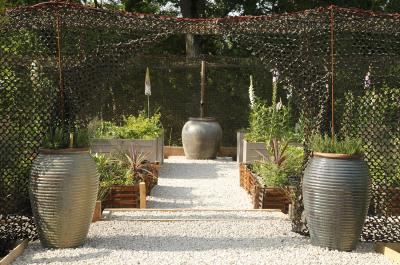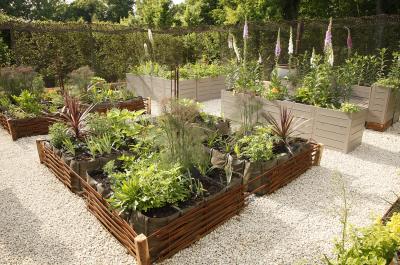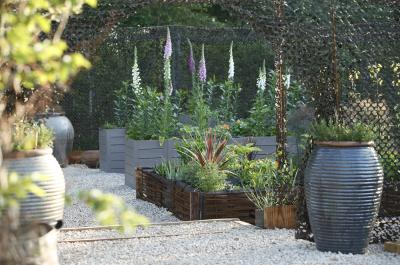06. Le Carré des simples : une alchimie du corps à l’âme ?
We are once again passionate about these herbs and condiments, which have a very wide range of virtues, just as we were in the 12th century.

They are referred to as simple because the monks, who were humble by vocation, created these small square beds of herbs that were simple but wisely chosen, both as medicinal plants and as culinary condiments. Each small bed was surface cultivated and was raised and marked out.
Nowadays, this secular technique also enables the most restricted urban spaces to be transformed into delicious pleasure gardens or tasty little vegetable gardens. There is no need to bend down to sow, to hoe, to renew the soil, etc. Modular removable containers can give the “Squares of simple herbs” a very contemporary look. They become not only a godsend for city gardeners, but also an effective way of bringing plants and nature back within everyone’s reach, and especially within that of people who are disabled or simply elderly.
This garden is a discovery, a sensual walk that takes you right through the simple herbs in all their forms and virtues, their powers and the spells they can create.
When its presentation at Chaumont-sur-Loire is over, this garden will be set up at Le Vésinet Hospital.
DESIGNERS
The “Carré des Simples” is a young company created in 2003 in Paris by a man who is passionate about plants and who was quickly able to raise awareness of his particular label known and get it well established – a blend of modernity and tradition, based on organic herb teas and essential oils. It is a contemporary herbalist’s, where a wide range of plants are available in all their forms, appealing to the five senses, whether for culinary, cosmetic or olfactory uses. The name “Carré des Simples” evokes plant expertise, a secret garden, a pause, a square of greenery, of peace in the everyday urban jungle. The instant recognition and growing reputation of the brand prove that the need was there for a place bringing the essence of the senses, based around plants, in their sensory, therapeutic and hedonistic aspects.
Jean-Claude Charlet has a commercial training background (graduate of Essec and Stanford) and is above all else an entrepreneur who has fallen in love with nature and culture. Jean-Claude Charlet has been eclectic in his past professional choices (humanitarian, publishing, internet), but always passionate about the product and people, and he is eternally curious about life. Nowadays, he balances his professional life between the “Carré des Simples”, which he founded 6 years ago and is actively developing, and teaching, as the person responsible for the “CPI” (Creation of an Innovative Product) programme, which he created jointly with Essec, the Ecole Centre Paris and Strate Collège Designers, focusing on innovation, multidisciplinarity and sustainable development. Another way for him to show that business, humanism and social responsibility are not contradictory.
Anne Ribes trained as a nurse and founded the “Belles Plantes” [Beautiful Plants] association more than 10 years ago. At the “Pitié-Salpêtrière” Hospital, where she planted a vegetable garden herself and where she runs child psychiatry workshops gardening workshops, the children call her “Anne Garden”. In the gerontology department of the Louis Mourier Hospital in Colombes, she created the “Garden of Ages”, a 100 m2 space where every week children from nursery schools garden with elderly people at a “kitchen garden – flowers” workshop. Her idea of creating “healing gardens”, of promoting a “green hospital”, is the fruit of an unusual and exciting career path, along which she picked up her nursing diploma and a “BTS” (advanced vocational qualification) in horticulture.
Elaine Jarvis is a British landscape gardener with a diploma from the Royal Horticultural Society (RHS) who is passionate about the history of gardens. She created and restored numerous gardens, first of all in Spain, then from 1982 onwards in England, where she held the post of Head Gardener for the renovation project of 3 hectares of historic grounds which had been left abandoned for ten or so years. The restoration of these undulating grounds, with their century-old trees, their rose garden and their kitchen garden was a thrilling long-term undertaking. She is now working in France where she has been living for 10 years. In 2000, she cofounded a landscaping company in Normandy. Later on, she refocused her professional activities based around her personal convictions in terms of ecology, in particular on the themes of well-being and the conservation of biodiversity, and more especially on the “sustainable” garden and the “therapeutic” garden, a concept which is currently more developed in the Anglo-Saxon world.
Cécile Halley des Fontaines is a designer and a government-approved architect who won the prize for the best diploma from the Academy of Architecture in 1995 for her work on the subject of “Architecture and Lightness”. She is pursuing her eclectic career path, nourished by the open-skied landscapes of her childhood, still in search of nature and curious about sensitive universes. After learning her profession with the architect Jean Nouvel and taking an active part in the restructuring of the “Au nom de la rose” brand and in developing its new dynamism over a period of 8 years, she created her own agency specialising in global identity in 2004. Le Cèdre Rouge, Le Prince Jardinier, Le Carré des Simples, and more recently Mademoiselle bio, are all customers. All of these are companies with high values, oriented towards respect for the environment and people, the garden and scents, which are dear to her.


